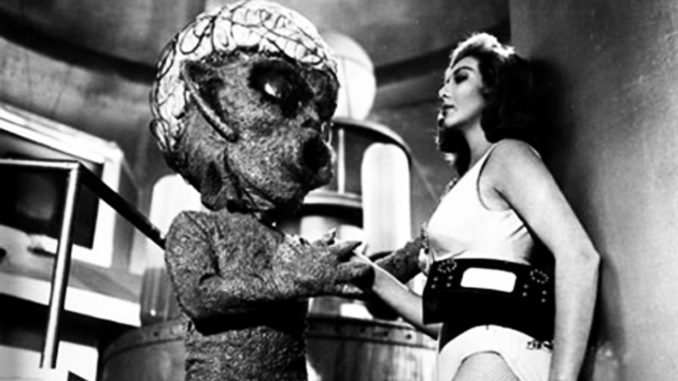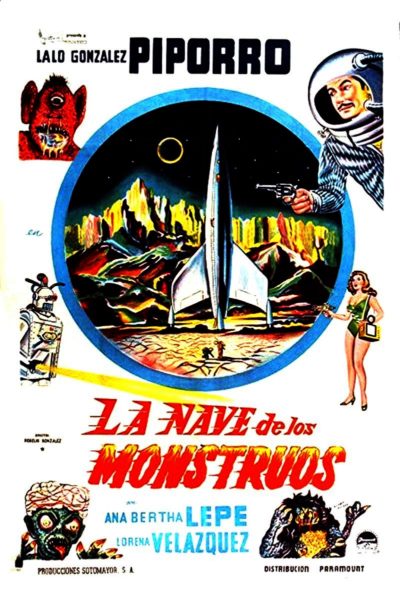
Rating: C+
Dir: Rogelio A. González
Star: Eulalio González, Ana Bertha Lepe, Lorena Velázquez, Heberto Dávila Jr.
a.k.a. La nave de los monstruos
Eight years before Mars Needed Women, it appears that Venus Needed Men. Atomic strife having wiped out that side of the gene pool, the Venusian ladies decide to send a spaceship around the galaxy, looking for suitable stock to replenish it. The craft is piloted by Gamma (Lepe) and Beta (Velázquez), who have certainly picked up some… unusual examples of masculinity, to put it mildly. Never mind genetic compatibility, anatomical compatibility would seem a likely show-stopper, shall we say (top). On the way back to Venus, their spaceship malfunctions, and is forced down in Northern Mexico. Oddly, Venus has entirely overlooked this planet, despite it being… oh, only the nearest one. Women, huh?
They encounter cowboy Lauriano (González, a.k.a. “Piporro”, a popular local entertainer of the time) and decide he’s perfect for their purpose. However, Beta isn’t a “real” Venusian, being a vampire from the planet of darkness. Her true nature breaks through, and when she is sentenced to be disintegrated for her blood-sucking way, rebels against her co-pilot. She wants to turn Earth into her personal blood bank, and releases the creatures they collected from their frozen stasis. They lay waste to the local area, including turning Lauriano’s cow, Lollobrigida, into a bovine skeleton. This atrocity will not go unanswered. It’s up to him, Gamma and their robot pal who’s fun to be with, to stop the evil alien conqueress and teach Gamma about this strange Earth thing called “love.”
 It’s all thoroughly ridiculous, and about as convincing as you’d expect, given the lead actresses were beauty pageant winners, both apparently having won Miss Mexico. They’re certainly the least convincing spacecraft pilots I’ve seen, sporting costumes which appear to have strayed in from a Greek marketplace. Lauriano has a local reputation for spinning ridiculous tales – this might have been part of his comedic stylings at the time, but here only serves to slow the movie down – and also bursts into song on more than one occasion. I could have done without that: if I want to hear shitty Norteño music (and, trust me on this: I don’t), I just need to open my Arizona window on a Saturday night.
It’s all thoroughly ridiculous, and about as convincing as you’d expect, given the lead actresses were beauty pageant winners, both apparently having won Miss Mexico. They’re certainly the least convincing spacecraft pilots I’ve seen, sporting costumes which appear to have strayed in from a Greek marketplace. Lauriano has a local reputation for spinning ridiculous tales – this might have been part of his comedic stylings at the time, but here only serves to slow the movie down – and also bursts into song on more than one occasion. I could have done without that: if I want to hear shitty Norteño music (and, trust me on this: I don’t), I just need to open my Arizona window on a Saturday night.
Yet there is a certain charm to proceedings. Some of the effects are quite impressive, considering this dates from a point before man (or woman) had gone into space. However, it appears these were largely knocked off from a Russian movie, Road to the Stars, so I can’t in fairness award credit for them. It does acknowledge its own silliness, and I had to laugh when the robot started trying to flirt with Lauriano’s juke-box, complimenting its bulbs. This actually pays off at the film’s end in an unexpected and pleasing way. It still feels like there are too many scenes that go nowhere, and my attention was definitely wandering for a non-zero portion of the time. Self-awareness can only take you so far.
